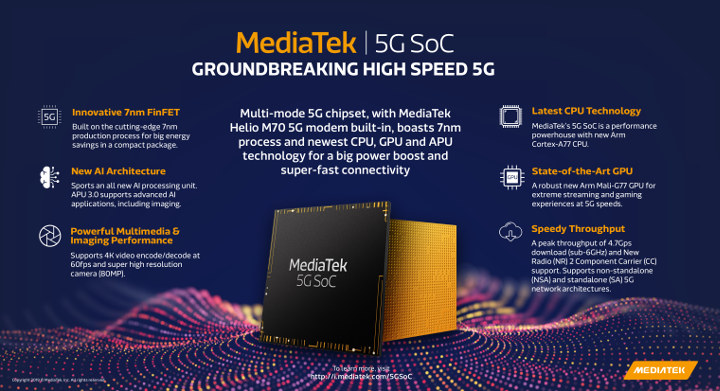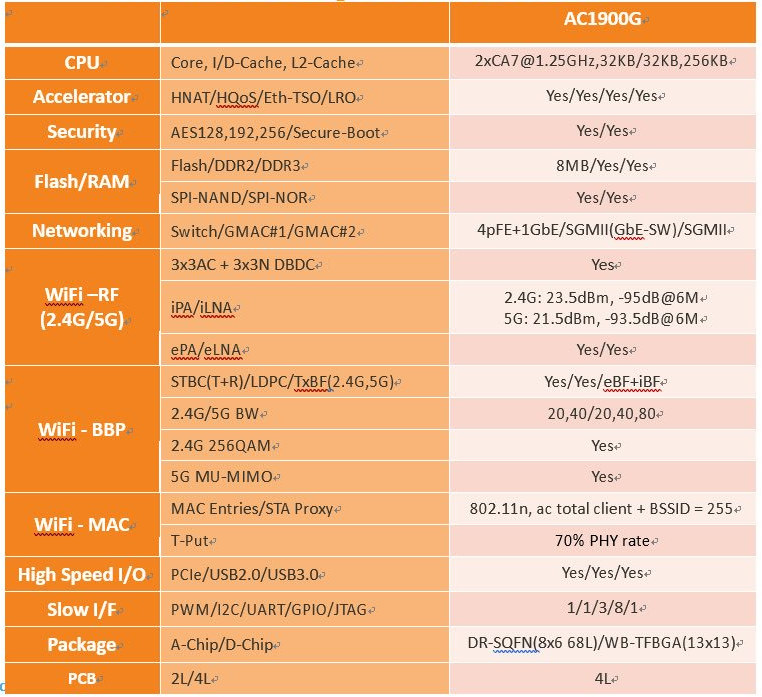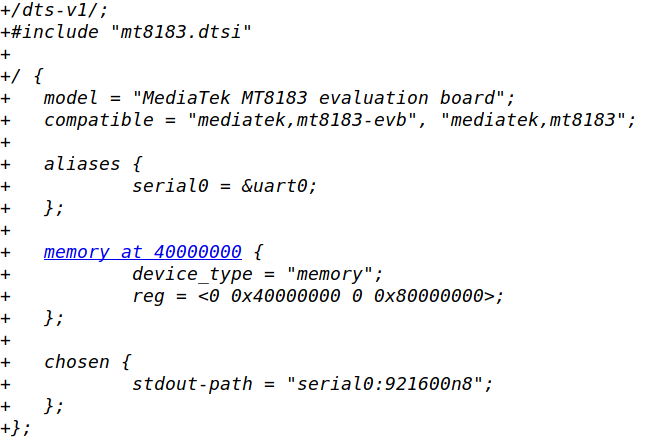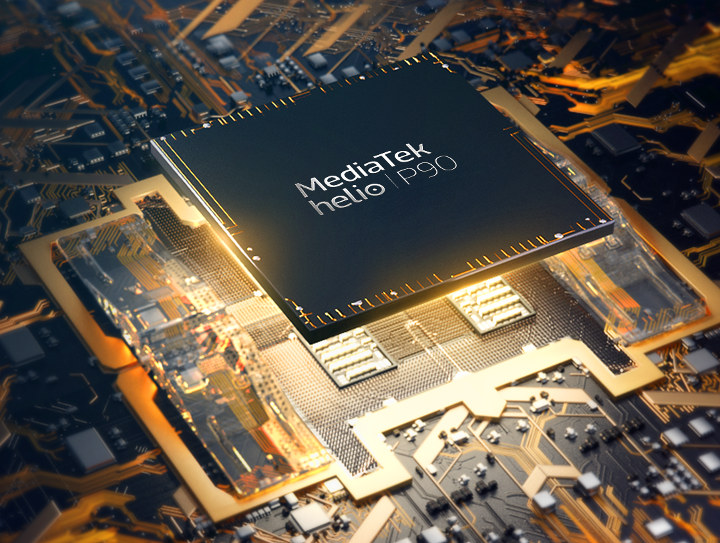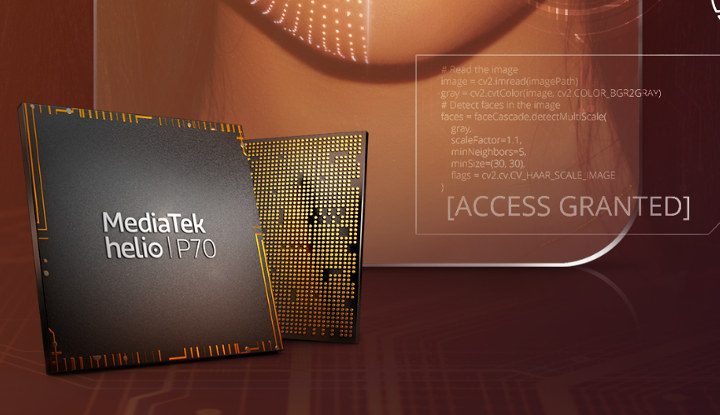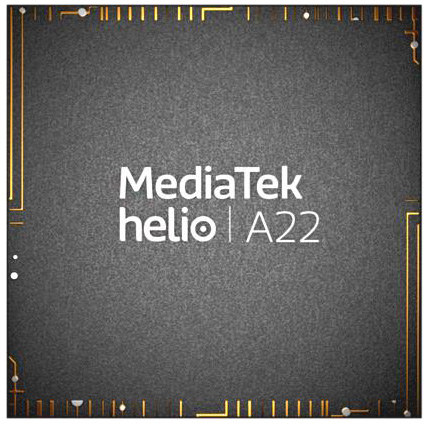MediaTek has recently unveiled their i700 octa-core AI IoT Platform, which succeeds their little known MediaTek i500 (MT8385) processor, and features two Cortex-A75 cores, six Cortex-A55 cores, coupled with MediaTek APU 2.0 comprised of a dual-core AI processor, AI Accelerator and AI face detection engine that is said to offers 5x greater performance than the i500.. The new SoC also features an Imagination 9XM GPU clocked at 970MHz, as well as a tri-core ISP with support for a single 32MP camera or a 24MP+16MP dual-camera setup. MediaTek i700 key features & specifications: CPU – 6x Arm Cortex-A55 cores @ 2.0 GHz, 2x Arm Cortex-A75 cores @ 2.2 GHz GPU – Imagination PowerVR 9XM-HP8 (GM9446?) GPU @ 970 MHz MediaTek APU 2.0 AI engine – Dual-core AI processor, AI Accelerator, AI Face Detection Engine; Neuropilot SDK support Memory – Up to 8GB LPDDR4x, 1866MHz Connectivity Cellular – Carrier Aggregation (CA), CDMA2000 […]
MediaTek Helio P65 Octa-core Processor Combines Cortex-A75/A55 Cores with Arm Mali-G52 GPU
MediaTek Helio P65 is a mainstream’s octa-core processor with two Arm Cortex-A75 clocked at up to 2.0 GHz and six Cortex-A55 cores combined with an Arm Mali-G52 2EEMC2 GPU. What does 2EEMC2 mean you may ask? Well, I have absolutely no idea either, and MediaTek did not bother expanding on the subject. Nevertheless, Helio P65 is said to deliver 25% performance improvement over “competitor alternatives that use older generation cores”, and twice the AI performance over previous generation mainstream Helio series, and up to 30% faster performance versus direct competitor SoCs in AI-camera tasks such as object recognition (Google Lens). The processor also implements VoW (Voice on Wakeup) capability which the company claims “optimizes platform size and power use”, and separates the audio channels for voice commands and calls from media and games in order to deliver better audio quality. MediaTek Helio P65 specifications: Processor – 6x Arm Cortex-A55, 2x […]
MediaTek 5G SoC to Feature Arm Cortex-A77 Processor & Mali-G77 GPU
It did not take long this time. Just a couple of days after Arm announced their latest Cortex-A77 CPU and Mali-G77 GPU IP blocks, MediaTek unveiled an upcoming 5G processor based on their Helio M70 modem, an unspecified number of Arm Cortex-A77 cores, a Mali-G77 GPU, all manufactured using a 7nm FinFET process. The company did not bother finding a name for the processor nor provided details specifications before the announcement, but here’s what we know about the first MediaTek 5G SoC: CPU- Arm Cortex-A77 cores GPU- Arm Mali-G77 NPU – APU 3.0 with support for advanced AI applications including imaging Video – 4K60 video encode and decode Camera – 80MP ISP Cellular Connectivity – Helio M70 5G modem with peak 4.7 Gbps download using sub-6GHz bands, support for standalone (SA) and non-standalone (NSA) 5G networks Process – TSMC’s 7nm FinFET Samples will be available in Q4 2019, and commercial […]
Mediatek MT7629 Dual Core Arm Processor to Power AC1900 Routers
MediaTek is working on a new dual core Cortex A7 processor that supports OpenWrt and targets AC1900 WiFi routers. That’s what I learned from a tweet by WidoraIoT detailing the main features of MediaTek MT7629 SoC as shown in the table below. So basically we have two Arm Cortex-A7 cores clocked @ up to 1.25 GHz, 8MB built-in? flash, HW accelerators and security/crypto engines, multiple Gigabit and Fast Ethernet interfaces, built-in support for 802.11n (WiFi 4) 3×3 MIMO and 802.11ac (WiFi 5) 3×3 MIMO, as well as various interfaces such as PCIe, USB 2.0, USB 3.0, and the usual slower I/Os like I2C, PWM and UART. A web search mostly shows code commits to Linux and U-boot, and we learn a few extra details such as MT7629 shares the same PCIe IP block as MT7622 dual core Cortex-A53 processor. It also reveals a forum post on Widora website with a […]
MediaTek MT8183 Octa-core Cortex A73/A53 SoC Targets Chromebooks
MediaTek processors have been found in a few Chromebooks notably in MediaTek MT8173 powered Acer Chromebook R13, but the quad-core Cortex A72/A53 processor hasn’t made it into many models like the hexa-core Rockchip RK3399 “OP1” processor. However, I’ve been informed there are a few patchsets that have been submitted to mainline Linux and V4L2 mailing lists about MediaTek MT8183 octa-core Cortex A73/A53 processor. The latter adds a Digital Image Processing (DIP) driver on MediaTek MT8183 SoC, “which will be used in camera features on CrOS application” and some code related to MT8183 is found in Chromium OS repository, so those clues should confirm the octa-core processor will end up in Chromebooks, with the current MT8183 reference board being named Kukui. There aren’t any product pages for MT8183 on MediaTek website just yet, but by looking at the source code (e.g. Device tree file), and some clues around the web, we […]
MediaTek Helio P90’s APU 2.0 Quadruples AI Performance
Mediatek has launched another of their Helio P-series processor. We’ve gotten used to getting incremental improvements when it comes with CPU and GPU performance, but now companies are able to deliver massive improvement for neural network accelerators, and MediaTek Helio P90 can deliver four times (4.6x) the A.I. performance over Helio P60/P70 thanks to its APU 2.0. MediaTek Helio P90 key features & specifications: CPU – 2x Arm Cortex-A75 processors @ 2.2GHz and 6x Arm Cortex-A55 processors @ 2.0GHz using DynamIQ technology GPU – Imagination PowerVR GM 9446 GPU @ 970 MHz NPU – MediaTek APU 2.0 fusion AI architecture with 1127 GMACs (2.25TOPs) MediaTek CorePilot for sustainable peak performance, longer battery life and lower operating temperature System Memory – Up to 8GB of LPDDR4x memory @ 1866MHz Storage – UFS 2.1 Display – Full HD+ (2520×1080) resolution, 21:9 aspect ratio Camera Up to 48MP single camera or 24+16MP dual […]
MediaTek Helio P70 Launched as an Upgrade to Helio P60 Processor
MediaTek Helio P60 processor was introduced earlier this year as one of the first Arm Cortex A73 processors from the company, and also integrated NeuroPilot AI technology for faster or more complex A.I. workloads. The company has now launched an upgrade with Helio P70 that comes with many of the same features combined with incremental performance and power consumption improvements. MediaTek Helio P70 key features and specifications with highlights in bold showing differences over Helio P60: CPU – big.LITTLE octa-core with four Arm Cortex-A73 up 2.1 GHz and four Arm Cortex-A53 up to 2.0 GHz GPU – Arm Mali-G72 MP3 at 900MHz Multi-core AI processing unit (Mobile APU) – 280 GMAC/s; offers deep learning facial recognition, object and scene identification, user behavior-informed performance and other AI and AR application enhancements. System Memory – Up to 8GB, dual-channel LPDDR4x @ 1800 MHz, up to 4GB LPDDR3 @ 933 MHz Storage – […]
MediaTek Introduces Helio A-Series Processors for Mid-Range Smartphones, Starting with Helio A22 SoC
MediaTek started their Helio processor portfolio with X-series processors such as Helio X20 in 2015, with X standing for eXtreme performance. Since then the company has mostly stopped aimed at the top of the market, and launched P-Series (Premium) the next year with Helio P20 processor among others, which do not quite offer the same level performance, and can be found in smartphones that are sometimes referred to as mid-range premium mobile devices. The company has now launched another Helio family of processor with Helio A-Series, with A standing for “Advanced” but it could also be read as “Affordable” since the new series targets the mid-range market. The first member of the family is Helio A22 system-on-chip (SoC) with the following key features and specifications: CPU – Quad core Arm Cortex-A53 processor at up to 2.0 GHz GPU – Imagination PowerVR GE8320 GPU Memory I/F – LPDDR3 up to 4GB […]




